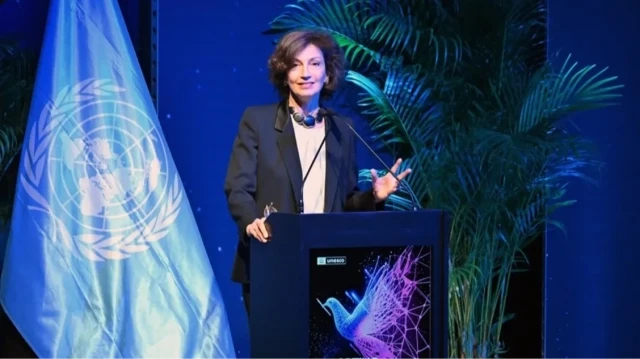
International Day for Remembrance of Slave Trade marked with rising pressure on US museums to reduce focus on slavery, racial injustice
A UN agency on Saturday urged the abolition of modern forms of human exploitation, even as renewed scrutiny of US historical institutions raised concerns about how slavery and its legacy are remembered.
“It is time to abolish human exploitation once and for all and to recognise the equal and unconditional dignity of each and every individual,” Audrey Azoulay, director-general of the UN Educational, Scientific and Cultural Organization (UNESCO), said in a statement for International Day for the Remembrance of the Slave Trade and its Abolition.
Observed annually on Aug. 23, the day marks the beginning of the 1791 uprising in then-Saint-Domingue, now Haiti, which played a pivotal role in ending the transatlantic slave trade. It aims to honor the memory of millions of enslaved people and acknowledge the global consequences of slavery, including its enduring effect on societies today.
Azoulay emphasized that “victims and freedom fighters” of the past continue to serve as examples for “future generations to build just societies.”
UN Deputy Secretary-General Amina Mohammed noted that the “fight is not over” as modern slavery persists in various forms. “Let’s confront injustice, past and present, and uphold the dignity and rights of every person,” she said.
The commemoration coincides with increasing political pressure on US cultural institutions, including Smithsonian museums, because of how they present American history, particularly race, slavery and identity.
On Aug. 19, US President Donald Trump criticized the Smithsonian Institution as “out of control” and alleged it focuses excessively on past injustices.
“Everything discussed is how horrible our Country is, how bad Slavery was, and how unaccomplished the downtrodden have been — Nothing about Success, nothing about Brightness, nothing about the Future,” he wrote on social media.
The post came after the White House launched a sweeping review of eight Smithsonian museums to ensure they “celebrate American exceptionalism” and remove “divisive or ideologically driven language.
The White House issued a statement earlier this week accusing the Smithsonian of promoting “woke ideology” that “distorts history,” citing specific exhibitions on African American, Latino and immigrant experiences. The administration argued that the exhibits undermine American values and contribute to a narrative of grievance.
In an executive order issued in March titled, “Restoring Truth and Sanity to American History,” Trump accused the Smithsonian of promoting “race-centered ideology” and undermining the legacy of the US.
The order directs federal agencies to review public monuments and museum exhibits, and urges budgetary restrictions on programs that “degrade shared American values.”
“Our museums should be places where individuals go to learn — not to be subjected to ideological indoctrination or divisive narratives that distort our shared history,” it stated.
The Smithsonian has not formally responded to the accusations, but it has already made changes to at least one exhibit related to Trump’s impeachments in 2019 and 2021. According to the online magazine, Slate, the institution’s leadership acknowledged in an internal message that exhibits “may evolve to reflect new discoveries and insights,” and it “cannot know what future critiques will hold.”
UNESCO’s annual remembrance is tied to its Routes of Enslaved Peoples project, which explores the historical causes and consequences of slavery, as well as the cultural interactions it produced across Africa, Europe, the Americas and the Caribbean.
UNESCO officials said Saturday that historical truth and cultural memory remain essential in building inclusive societies and preventing the repetition of past injustices.







